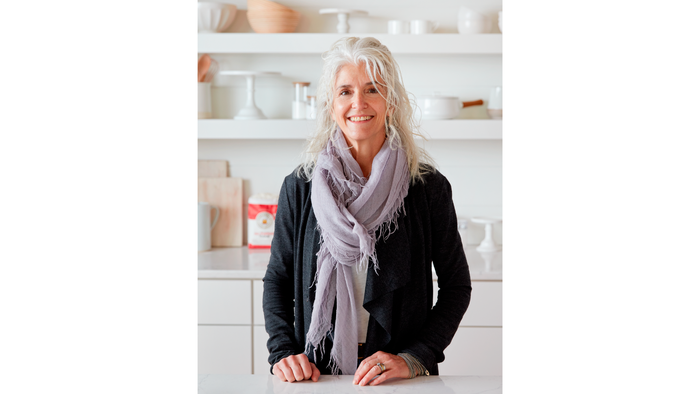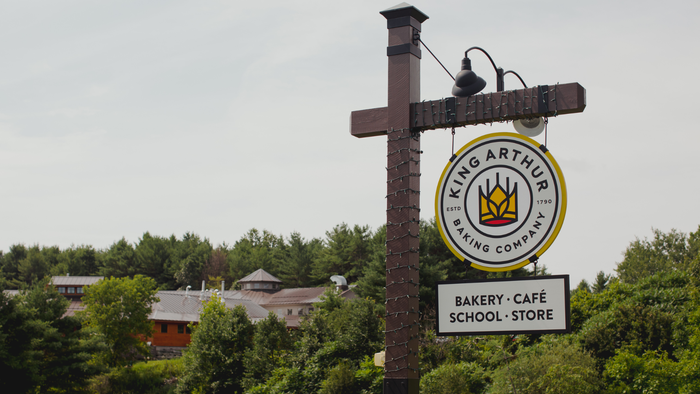King Arthur Baking Co.’s quest toward 100% regeneratively grown productsKing Arthur Baking Co.’s quest toward 100% regeneratively grown products
The Certified B Corp. and employee-owned company presents its NEXTY-nominated Regeneratively-Grown Climate Blend Flour at Expo West. Read more.
March 14, 2024

Karen Colberg, CEO of King Arthur Baking Co., knows her company’s goals are ambitious. But as the company has grown, so have its aspirations.
Strategic goals now include incorporating more regenerative agriculture. That’s translated into King Arthur Baking Co.’s aim to use 100% regeneratively grown wheat by 2030.
“Stewardship of the land is a value that’s been deep in our DNA,” says Colberg about the Certified B Corporation. “We’ve been trying to assess where we can have a meaningful impact. Our biggest impact, when we think of climate change and the environment, is in agriculture.”
To tackle such a monumental task requires working with a lot of stakeholders.
“We decided we needed a multipronged approach to work with the expertise of our partners, our farmers, millers and crop scientists, to start saying, how do we tackle this audacious goal of getting to 100% regeneratively grown by 2030?” Colberg says.
With this new approach, King Arthur developed its second 100% regeneratively grown offering: Regeneratively-Grown Climate Blend Flour, a NEXTY Award finalist in the planet-forward product category.
Here’s how King Arthur is transitioning into regenerative agriculture and working with its partners, and what it will showcase at Natural Products Expo West March 12 to 16 at the Anaheim Convention Center in Anaheim, California.

How has moving toward regenerative agriculture impacted your supply chain?
Karen Colberg: One prong of our multipronged approach is influencing our milling partners to make changes. We are an asset-light business. We don’t own our mills, so we work with a range of milling partners.
How did you start the process?
KC: We asked, How do we influence the farmers? We knew we wanted to ask for change and we can. The first thing we did was educate ourselves, both in terms of assessing our impact and knowing where and what we can ask [from our farmers, milling partners]. That prepared us for when we started trying to use our voice and influence.
Can you explain more?
KC: We are working with our milling partners to convert acreage. We have a long-term relationship with Washington State University Breadlab. They are wheat and grain breeders. We asked them to help us develop a wheat or a blend of wheat that’s fully regenerative grown.
There are a range of practices, which is one of the many, many challenges because the practices vary by region and by climate. So regenerative practices aren’t the same across the country.
How did you solve that problem?
KC: Breadlab found three farmers for us in North Dakota and Montana to help us grow the wheat that’s the formula for our Regeneratively-Grown Climate Blend Flour. The scale is quite small right now. It’s exclusively sold at Whole Foods and on our website. But we’re launching it at Expo West. It’s our second fully 100% regeneratively grown product.
We also have our Golden Wheat, formerly our White Whole Wheat Flour. We worked with a cooperative of farmers called Farmer Direct Foods.
We went to them and said, “We want to be able to fully trace the wheat to the field and be able to ensure we’re regenerating the soil, not just sustaining it. Together, let’s understand what practice will do that in your region where the wheat is grown.”
What’s in the Climate Blend Flour?
KC: It’s a unique blend of three wheat varieties. One is a perennial, so it doesn’t need to be planted again for two or three years, so you’re disturbing the soil less and hopefully sequestering carbon more.
The innovative perennial wheat is a new concept. We’re sort of breaking ground here. It’s being created as a blend, in partnership with the Breadlab.
We had to put our standards on it. We had to test it in our test kitchens. It’s got to perform for the baker. So you have to check all of those boxes and then it has to be regeneratively grown. It’s small scale, but it’s something we’re excited to be out in front with.

You mentioned a multipronged approach. What else are you doing to transition to regenerative ag?
KC: There’s TAP, [short for] Trusted Advisors Partnership, in North Dakota. We’re working with crop scientists who work with farmers to help them learn how to convert practices.
Farmers are the most trusted stewards of the land. We aren’t farmers, so we found this program, we support financially, and [we] say please go work with these farmers and help them understand and learn and test how to start converting the land.
There’s also the consumer-facing piece, educating the consumer on what it means to have something regeneratively grown.
How are you doing that?
KC: If you survey people, they absolutely will say they care about the environment. But when it comes to voting with their wallet, it’s sometimes harder.
There’s a disconnect that makes perfect sense. People are rational. We need to educate around why there might be a transition period where if we get to scale on this, regeneratively grown products need not cost more than conventionally grown products.
On our website and in our market, we talk about why it matters and why it’s important to do regenerative agriculture, and why it’s a journey—a really long journey.
What does being an ESOP company mean to King Arthur Baking?
KC: Being an ESOP, an employee [stock] ownership plan, is very much part of our culture. The company was family owned for five generations. Frank and Brinna Sands are still in our town a few miles away.
When they decided to retire, they wanted to transition the ownership to the employees. It was a wonderful opportunity to preserve the company and what it means to the community with all the jobs that come [from] having this business here.
They ran the company as an open book, which we still are today. People can ask anything they want about how things are going. Everyone has a stake in the business.
How does that impact the workplace?
KC: It creates a level of shared accountability. There’s a level of transparency and accessibility that I’m really proud of. It’s important to me that people feel like they can ask questions. We can disagree on things and know why decisions are being made, and they can ultimately support them even if they disagree. An ESOP is essentially a retirement plan, but it’s deeply ingrained in the culture of the company.
What’s your plan for Expo West?
KC: We’re going to have two booths this year. It’s incredibly exciting and a first for us. We’re going to showcase our Climate Blend and Golden Wheat Flour in Hall E. And in the main floor, Hall A, we’re launching our savory bread mix kits. We’ve got several SKUs including pull-apart garlic bread, pretzel bites and focaccia.
Correction: The NEXTY Awards category for King Arthur Baking's Regeneratively-Grown Climate Blend Flour was incorrect. It is a finalist in the Best Planet-Forward Category.
About the Author
You May Also Like





